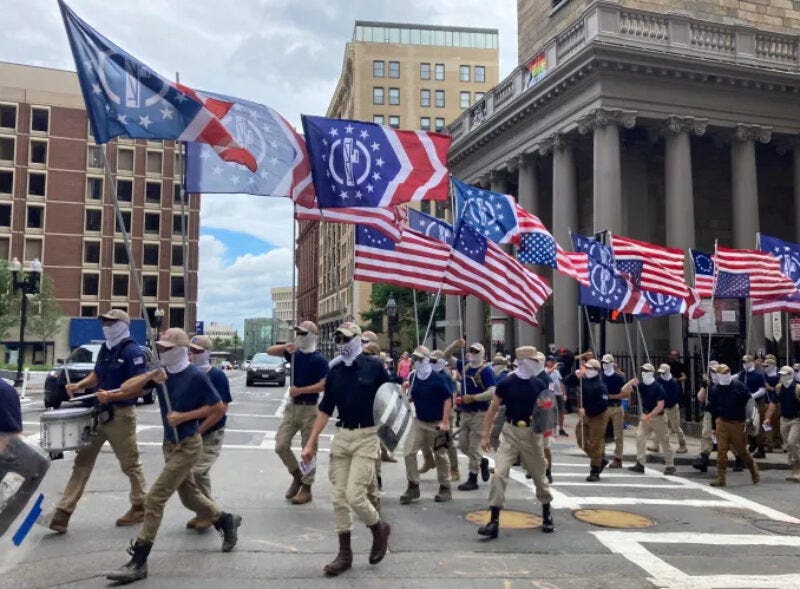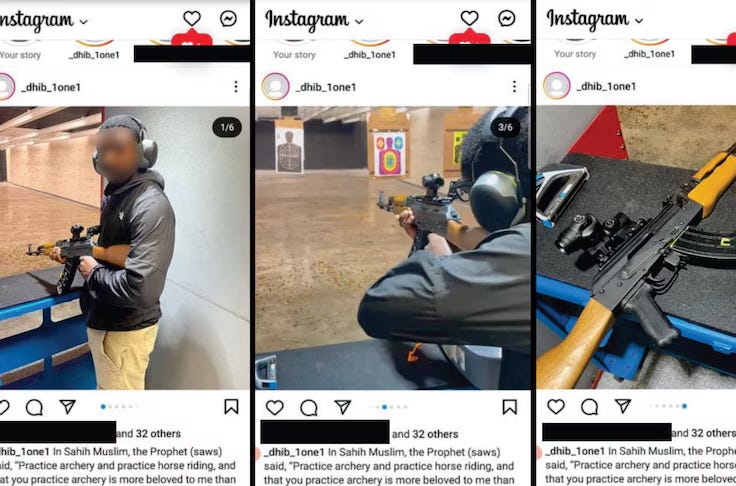

Discover more from @amuse
In recent years, the FBI has become increasingly skilled not at capturing the masterminds of terror but at fabricating their own foes, preying on the vulnerable, the mentally ill, and the socially isolated. What once was a proud institution tasked with the safeguarding of the Republic now finds itself busying thousands of its agents not with countering sophisticated threats to the nation but in entrapping men who, left to their own devices, would likely never muster anything more dangerous than a misguided blog post. Instead of arresting actual dangers to society, the FBI is, with alarming frequency, manufacturing them from scratch.
Take the case of Skyler Philippi. A 24-year-old white male, Philippi was the quintessential portrait of a young man left behind by society. Picked on as a child, he drifted into adulthood as a loner. He struggled with school, and he lived at home—a trajectory seen among many young men today who have neither community nor economic opportunity. Philippi found himself in the orbit of an FBI informant, a virtual relationship that offered him something he had long yearned for: recognition. The discussions initially revolved around revenge fantasies—but nothing more. Philippi, despite his deep-rooted anger at society, was devoid of the ability or the will to make such plans real. Enter the FBI, who encouraged him to think bigger. Shoot up a YMCA? “No,” they suggested, “a power plant”—the kind of attack that would put him in the history books.
Through these interactions, Philippi experienced something new: belonging. He had “friends”—in fact, multiple agents who cheered him on and offered him validation. They bought him pizza, they listened to him, and crucially, they offered him a way to matter. When he finally prepared to carry out his attack—albeit with a dummy explosive—he did so buoyed by the fellowship of agents whose sole purpose was not to help him become a better person, but to entrap him into committing a crime. It is an indictment not of Philippi, but of the FBI, that their enticement and resources led this baby-faced loner down a path that has ruined his life. What could have been different had Skyler simply been offered job training, counseling, and real friends? He recently found a job at Ryder, but it was too little, too late—not against the gravity of an FBI-engineered plot.
Michael Sam Teekaye's story is eerily similar. Befriended by the FBI at just 16, Michael was the classic misunderstood youth. He lived in his parents' basement, had been diagnosed with schizophrenia, and struggled with mental retardation. Over five years, the FBI cultivated Michael, feeding his delusions, suggesting he fulfill his fantasy of joining ISIS. Michael, with no money and no courage to leave his parents’ basement, spent years talking to an FBI friend who convinced him that his dream was valid. It was not Michael’s dream that was criminal—it was the FBI’s exploitation of it. They encouraged a mentally ill child, over nearly a quarter of his young life, only to arrest him once they had finally manipulated him into buying an airline ticket purchased for him by another FBI asset. His reward for these years of fake friendship? Arrest. Years in prison. The hollow boast of ‘victory’ for the FBI. This was no victory—it was a tragedy orchestrated by those who should have protected him.
The same story repeats itself, tragically, in the case of Alexander Scott Mercurio, whose youthful anger and isolation during the Covid lockdowns led him to one outlet—the FBI posing as friends. Here was a young man, only 16, whose depression, anxiety, and sub-90 IQ left him vulnerable. During the lockdowns, his FBI friends were his only connection to the world outside his home. They convinced him that by converting to Islam and pledging loyalty to ISIS, he could find purpose and camaraderie. They encouraged him to talk about committing acts of violence. By the time he turned 18, they arrested him. This young man’s crime was not the planning of a terrorist attack—his crime was loneliness and misplaced trust in those whose only aim was his downfall.
This same narrative takes on an even darker hue with Harun Abdul-Malik Yener—a 30-year-old homeless man from Florida. Yener’s story is one of abject poverty. Living out of a storage unit, he had nothing—no resources, no connections, no hope. The FBI, seeing his vulnerability, befriended him, drawing him in with promises of camaraderie and assistance. They convinced him that they were part of an anti-government militia, ready to fight alongside him. They introduced the idea of blowing up the New York Stock Exchange. With promises to help him acquire explosives, they turned a man with nothing—a man whose most advanced weapon was a used pressure cooker bought at a pawn shop—into ‘a threat to America.’ When they finally arrested him, they boasted of foiling a major plot. But Yener had no money, no way to get to New York, and no friends except the ones he believed were on his side. This was no major victory for law enforcement; it was the exploitation of a mentally ill, destitute man who only wanted a friend.
The tragic irony here is how consistent these stories are: young men, lonely, impoverished, mentally unwell, seeking some purpose, and finding in the FBI the friends they always wanted. But these friends did not have their best interests at heart—they had an agenda. The FBI is not solving crime; they are inventing it, molding these young men into what they never would have become on their own. It is the worst kind of betrayal: taking advantage of someone desperate for belonging, desperate for purpose, and convincing them to turn that desperation into acts of violence they are wholly unequipped to carry out without FBI guidance.
One has to ask—what if, instead of spending years building relationships with young, mentally ill, and impoverished men with the intent to entrap them, the FBI spent that time actually helping them? What if those resources went to counseling, job placement, mental health support, and real community building? What kind of country would we have if, instead of celebrating these hollow victories, we had fewer young men driven to acts of desperation because society had offered them something better than isolation and destitution?
The FBI’s practice of identifying vulnerable men and providing them not with support, but with the tools to hang themselves, is a moral failing of the highest order. It is a condemnation not of those they entrap, but of the system that allows—even celebrates—such actions. It has to stop. These men do not need the FBI as their false friend; they need real ones. They need communities, jobs, counseling, and hope. And they need a society that sees them as worthy of saving—not as potential criminals waiting to be exploited for the next FBI headline.
There is, however, a glimmer of hope on the horizon. As we look forward to a potential change in leadership, it becomes increasingly clear that the right person at the helm could transform this corrupted institution. Donald Trump's likely pick for FBI Director, Kash Patel, is precisely the kind of leader who could put an end to this nightmare. Patel, with his extensive experience in national security and his clear-eyed understanding of the abuses that have plagued the FBI, is uniquely positioned to clean up the Bureau. He understands the true purpose of law enforcement: to protect the public, not to manufacture enemies for political or institutional gain. Under Patel’s leadership, the FBI could refocus on legitimate threats, ensuring that resources are spent on true public safety concerns rather than fabricating crimes to justify its own existence.
Kash Patel is known for his tenacity and his willingness to challenge entrenched bureaucracies. He has demonstrated a commitment to the rule of law and a disdain for the kind of overreach that has come to define the modern FBI. His approach would prioritize accountability, transparency, and a return to the core mission of protecting American citizens. If given the opportunity, Patel could dismantle the networks of informants who prey on the vulnerable, redirecting those resources toward rehabilitation and community support for those who need it most. This is the leadership the FBI desperately needs—a leader who will demand integrity from his agents, who will put an end to the entrapment of vulnerable individuals, and who will restore the FBI’s reputation as a force for justice, not manipulation.
It is time for a change. It is time to stop the cycle of entrapment and start building a society that values every individual, no matter how marginalized. With leaders like Kash Patel at the helm, there is hope that the FBI can once again become an institution we can trust—one that protects, rather than preys upon, the most vulnerable among us.
If you don't already, please follow me on 𝕏 at https://x.com/amuse



















